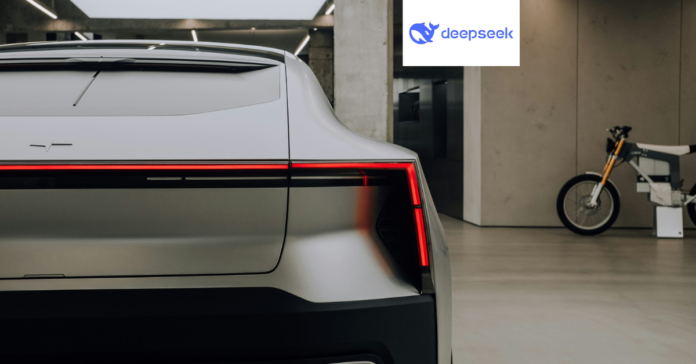DeepSeek mobility integration is permeating China’s transport sector. Automakers to e-scooter producers have begun incorporating AI into their products. The wave of uptake started first with primary electric vehicle manufacturers, now extending to the country’s leading electric two-wheeler brands.
DeepSeek integrates mobility into the auto space
Multiple Chinese auto makers, with various announcements in the past two weeks, will integrate DeepSeek’s AI technology into vehicles, with BYD, Geely, Great Wall Motor, Chery Automobile, SAIC Motor, and up-and-comers Leapmotor among them, according to the South China Morning Post.
BYD’s commitment to its technology stands out because it will integrate DeepSeek into Xuanji’s vehicle software platform. This integration of DeepSeek allows BYD to offer preliminary self-driving capabilities on nearly all of its models with no increase in sticker price, thus making autonomy more affordable for a wider range of consumers. It also covers around 20 models, including the super-cheap Seagull hatchback now priced at 69,800 yuan.
DeepSeek hits the e-scooter market
Of recent, the entire e-scooter industry of China was taken over by DeepSeek, Xiomi-backed Segway-Ninebot Group and Nasdaq-listed Niu Technologies will have incorporated AI into their electric two-wheelers.
Ninebot last Friday announced that it would “deeply integrate DeepSeek” into its products; it is expected that through its mobile app, features will be enhanced. The upgrades planned include AI-powered content creation, data analytics, personalized recommendations, and smart services riders.
Niu Technologies announced the integration of DeepSeek’s Large Language Models (LLMs) as of February 9 this year. The company will utilize the technology for:
- Driver assistance systems
- Riding safety features
- AI-powered travel companions
- Voice interaction
- Intelligent service recommendations
Yadea Group, the largest electric two-wheeler manufacturer by sales, announced on Saturday the intention to integrate DeepSeek’s technology into its ecosystem.
The rapid uptake of DeepSeek within China’s mobility sector is dubbed by market observers as “DeepSeek fever,” due to the cost-effectiveness of AI integration.The Hangzhou-based company has open-source AI models, DeepSeek-V3 and DeepSeek-R1, which operate at a mere fraction of the cost and computing power normally required for large-model-language projects.”Cars without DeepSeek will either lose market share or be finished off,” said Phate Zhang-the founder of Shanghai-based electric vehicle data provider- CnEVPost.
The expansion of DeepSeek mobility integration coincides with the rapid establishment of Chinese e-scooter brands in the overseas market. According to customs data, electric two-wheeler exports grew by 27.6% to US$5.82 billion in 2024, passing the previous high of US$5.31 billion set in 2022, while export volume increased by 47% to 22.13 million units.
Open source by DeepSeek has allowed for developing a collaborative ecosystem of innovation through platforms such as GitHub where developers can optimise and test for security.
A combination of these two factors is expected to give a leap in the deployment, training, and usage of large language models by companies. There seems to be an increasing effect of DeepSeek mobility integration on China’s transportation sector. Zhang Yongwei, General Secretary of China EV100, forecasts that around 15 million cars-contributing two-thirds of national sales-are expected to come equipped with Level 2 autonomous driving controls by 2025; this reveals the game-changing potential the technology possesses in restructuring China’s transportation system.


